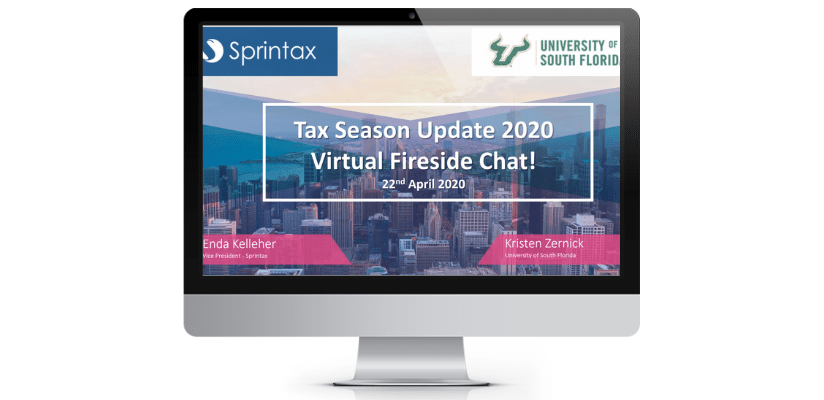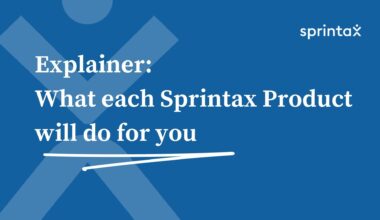Updated 7 May 2020
How coronavirus has affected nonresident tax compliance & how you can support your international students & scholars
The US government introduced the CARES (Coronavirus Aid, Relief and Economic Security) Act in direct response to the COVID-19 pandemic. The act provides for a one-time stimulus payment of $1,200 to be paid to workers who are earning less than $75,000 per year.
However, almost as soon as the CARES Act was introduced, a number of questions about the payment sprang up.
What are the eligibility requirements for the payment, can nonresidents benefit from the CARES Act, and what should an international student do if they receive the payment in error – these are just a handful of the queries being asked every day by students and universities alike.
In our webinar – How COVID-19 has affected nonresident tax compliance & how you can support your international students, scholars or J1 participants – we explore the common tax issues that COVID-19 has presented for international offices, payroll departments, visa sponsors and their nonresidents. We also answer some of the most common questions on the topic.

Here are the key takeaways from our COVID-19 Tax Webinar
The CARES Act
1. What is the Economic Impact Payment?
In short, the CARES Act is a stimulus package which aims to support workers with a one-time payment.
- Single individuals (earning less than $75,000 per year) will receive a payment of $1,200
- Married couples (who file jointly and earn less than $150,000) will receive $2,400
- Families will also get $500 per child
2. Who is eligible for the Economic Impact Payment?
An individual is eligible for this payment if they:
- Are a US Resident for tax purposes
- Have filed a resident tax return (Form 1040) in 2018 or 2019
- Will be considered a qualifying resident alien for the 2020 tax year
- Have an Adjusted Gross Income of between $75,000 and $99,000 (increasing for head of household and married filing jointly)
- Possess a valid social security number
- Not have been claimed as a dependent on another person’s tax return
Read more about the CARES Act payment and who is entitled to it here.
3. What about nonresident aliens, are they entitled to the Economic Impact Payment?
No, nonresident aliens are not eligible to receive this payment.
4. What is the difference between a resident and nonresident for tax purposes?
Firstly, it’s important to note that residency for tax purposes is completely independent of visa or immigration status.
Generally speaking, most international students, scholars and J-1 participants who are on F, J, M or Q visas are considered nonresidents for tax purposes.
Here’s some important points to keep in mind:
- F-1 and J-1 students are typically considered nonresident for their first 5 calendar years in the US
- Individuals in the US under other categories of J visa are generally considered nonresidents for 2 out of the last 6 calendar years in the US
- If they’ve been in the US for longer than the 5 or 2 year periods, the Substantial Presence Test will determine their tax residency
Sprintax will guide students through the Substantial Presence Test and confirm if they were a resident or nonresident for that tax year.
5. If an international student, scholar or J visa holder received the stimulus payment in error, what should they do?

The first thing to note is that any international student or J-visa holder, who will not be considered a resident alien for the 2020 tax year, is not eligible for the payment and must return the payment to the IRS.
International students and J-visa holders should also double-check which tax return they prepared for 2018 and/or 2019. They will need to determine whether it was a Form 1040 (for residents) or a Form 1040NR (for nonresidents).
If they filed a Form 1040 this means that they filed as a resident for that year.
To double-check that their tax return was filed correctly, the student can simply:
- Login to Sprintax
- Complete the free Substantial Presence Test. Our software will confirm whether the student was a resident or nonresident for that tax year
If the individual has previously filed as a resident and the result of the Substantial Presence Test is that they should have filed as a nonresident, they must prepare and send an amended tax return (1040X) to the IRS.
We recommend that the nonresident amends their incorrect return as soon as possible and this can be easily done online using Sprintax.
Finally, they should also return the stimulus payment to the IRS. It’s a good idea to include a cover note to explain why they are returning the payment. Return of the payment should be done separately to filing the amended return.
More details on how to return your payment to the IRS can be found here.
Finally, the individual should ensure to keep personal copies of everything they send to the IRS.
If the individual has previously correctly filed as a resident, and they will also be considered a resident for 2020, they will be entitled to keep the payment.
6. An international student, scholar or J visa holder files correctly as a resident in 2018 or 2019. They leave the US at the end of 2019 and return to their home country. In April 2020 they receive the stimulus payment. What should the student do in this scenario?
In this scenario, the individual will not be considered a resident alien for the 2020 tax year and should return the payment to the IRS.
7. Will the IRS eventually be sending out notices to collect the $1,200 payments which were made in error?
Yes, the IRS has provided guidance for individuals who have received the check-in error.
You can read more here about what to do if you received the check-in error.
8. Is the stimulus check considered taxable income?
Generally, this type of payment is not taxable.
However, the IRS has not yet provided final confirmation on whether the stimulus check will be considered taxable.
9. If someone needs to amend their federal tax return, do they also need to amend State tax return?
Yes, depending on their personal circumstances, the individual may also need to amend their State tax return too.
10. Can Sprintax help with amended tax returns?
Yes, Sprintax can help nonresident students, scholars, J visa holders, and professionals with their amended tax returns.
You can learn more about how Sprintax can assist with tax return amendments here.

Tax filing FAQs
11. Who needs to file Form 8843?
Filing Form 8843 is the minimum requirement for all nonresidents.
Students and scholars as well as J visa holders need to file Form 8843 irrespective of whether they have received income or not.
Read more about Form 8843 here.
12. What are the filing requirements for nonresidents who receive housing or housing allowances?
Generally, this is considered to be taxable and reportable.
If the nonresident earns more than $0 in taxable US income, they need to file a federal tax return if they are a nonresident for tax purposes. They may also have a State filing requirement.
You can find more information here.
13. What should a nonresident do if they are filing from overseas? Is e-filing available?
E-Filing options are limited for nonresident students who are filing from outside the US. Most students will be required to physically mail their tax returns to the IRS.
It’s important to factor in that delivery times will potentially be delayed due to the coronavirus pandemic. This is why it’s a good idea for a student to file their tax documents as soon as possible and use a registered delivery service when mailing the documents from overseas.









